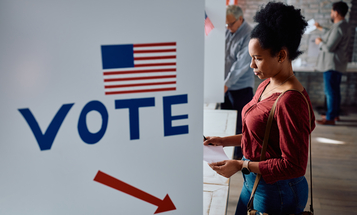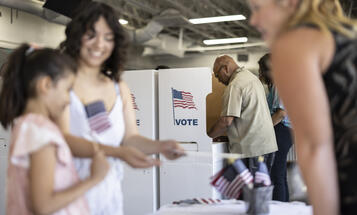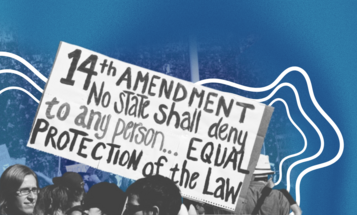
A look at how the show Scandal handled dog whistle politics
Scandal introduced general audiences to the practice of dog-whistle politics, but it’s also important to know the political consequences of dog-whistle appeals.
A few weeks ago, Scandal took on dog-whistle politics and repeated the term enough times that it will no doubt be stuck in the heads of many of its viewers for a while. During the episode, the newest Gladiator Marcus defines dog-whistle politics as “racism, sexism, Anti-Semitism, misogyny, …bigotry in the form of a language so coded that only the person it’s targeting is insulted by it.”
Demos Senior Fellow and John H. Boalt Professor of Law at the University of California, Berkeley Ian Haney López also offers a definition in his book Dog Whistle Politics: How Coded Racial Appeals Have Reinvented Racism & Wrecked the Middle Class. Lopez defines dog whistle politics as “coded terms like “inner city crime” and “silent majority” that on the surface do not mention race, but that just underneath course with racial power, telling a story of decent whites under threat from dangerous minorities.” The definition used on Scandal is a good introduction into the practice of dog-whistle politics, but it’s also important to know the political consequences of these appeals. Dog-whistle politics is mostly used to manipulate voters into supporting candidates and policies that undermine their needs.
And considering the number of atrocious dog whistles and sometimes explicitly racist fire alarms used already in the beginning phase of the 2016 Presidential election, the Scandal episode could not have come at a better time. This pop culture intervention into a practice that is oft present in our political arena and public discourse, but not nearly discussed enough was important for many reasons.
Featuring this practice on an award-winning primetime drama series extends the conversation on dog whistle politics sparked last year by Lopez’s book and it also pushes us to start thinking about how invoking racially coded terms impacts people targeted on a personal level.
In the episode, the Black female lead character Olivia Pope, a DC ‘fixer’ and former White House Communications Director, has her reputation, career, and life poked and pried by the media once it is revealed that she’s having an affair with the president. As a survivor of kidnapping and torture by domestic terrorists interested in leveraging her as ransom to force the President to start a war in West Africa, Olivia has endured a lot. But even the subtle racism of dog whistle politics begins to take a toll on her. Olivia is a brilliant fixer herself, the best in the business, so when she instructs her Olivia Pope & Associates team of Gladiators to ignore the racially coded language reporters are using to describe her it would be assumed that it is the best strategy.
However, newly recruited Gladiator and former civil rights activists Marcus Walker grows tired of overlooking the issue after a reporter approaches him with a question about Olivia’s silence and how she is usually “so well-spoken” and decides to take matters into his own hands. His response is a great example of how to handle and challenge coded racial appeals. At that moment, directly following the comment, Marcus confronts the reporter by bringing to the forefront what is implied when someone says a Black woman is “well-spoken.” He then goes on to mention the many other coded words used to describe Olivia that suggest she’s an angry Black woman and that she’s a homewrecker that slept her way to the top.
Calling out this language is important and powerful—we cannot just allow these racial frames to stand unchallenged. Because when they do, we get candidates and policies that devastate the middle class, destroy the social safety net, deregulate the financial market, and expand the prison-industrial complex.
While the episode is a fictional story created to entertain and allow us to escape our reality for 60 minutes, unfortunately, dog-whistle politics isn’t confined to Scandal. We’ve seen it before when in 2007 then Senator Joe Biden described his opponent for the Democratic presidential nomination Barack Obama as "the first mainstream African-American who is articulate and bright and clean and a nice-looking guy." And then again in 2012 when former House Speaker Newt Gingrich called President Obama the “food-stamp president.”
In the real world, dog-whistle politics is not just used for salacious headlines that malign one individual. It sprinkles speeches, rhetoric, and policy proposals from pundits, writers, reporters, and politicians across the aisle. One of the most famous examples of this was a 2014 comment from recently elected Speaker of the House Paul Ryan. Ryan stated that to fix poverty, he would focus on men in our “inner cities”—one of the most notorious dog whistles— and dealing with the “real culture problem” that drives poverty.
The problem with this statement is that poverty is presented in a way that suggests it’s synonymous with Black and it is framed as a condition that results from an individual’s failings; the person isn’t trying hard enough and doesn’t have the right work ethic. When politicians present the issue this way, it causes their audience to blame Black folk and the Black community for the problems they face. And government programs designed to ameliorate the systemic causes are vilified and perceived as entitlements; are as an activist government that coddles minorities. This is all part of a strategy to stoke white anxiety that a “Big Government” is taking their hard earned dollars and redistributing it to undeserving minorities. And the main goal is to win elections.
Once we recognize that we can be ready to refute it.
This election cycle, dog-whistle politics is morphing into something scarier than previous iterations of the subtle, racially coded practice. Now, we see politicians like Donald Trump using explicitly racist language and tropes to exploit white resentment towards minorities. And it’s not just limited to the candidate that John Harwood accused of running “the comic book version of a presidential campaign.” Jeb Bush took a more direct approach when he said a few weeks ago that he was not going to try to win the Black vote by giving them “free stuff”—the second time he’s made that comment on the campaign trail. And Christie decided to resort to the traditional, more subtle strategy during last night’s debate when he referenced, the ‘Ferguson Effect’—which at this point is a well-debunked myth.
As the rhetoric gets worse, it just means we have to be more vigilant in debunking the mythical foundations buttressing dog-whistle politics. There are a number of organizations and commentators doing this already. Color of Change released a report earlier this year that examined the representation of Black people in local news reporting on crime. Projects like this are an awesome way to challenge the myths around Black people and criminality. Doing this type of work is extremely important and is helpful for addressing implicit biases that we all hold.
Dog-whistle politics is a divisive tactic used to distract us from recognizing that we are more alike than different and have many of the same needs; like access to sustainably harvested, healthy food, quality schools that don’t mire us in debt, affordable housing, jobs that offer a livable wage, good benefits, and a predictable schedule, and the freedom to wander here and there without the threat of unjust state violence.
It won’t be easy to get to this understanding, but it’s a worthy cause to pursue if it will bring us together and get this nation to a point where every person has an equal say in our democracy and an equal chance in our economy.



